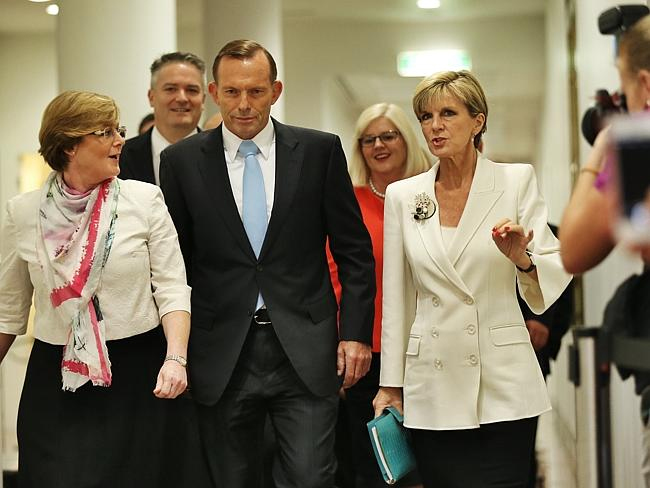The Liberal spill has only amplified the ignorance and uncertainty that characterises our national leadership. [10 February 2015 | Peter Boyer]
As a chastened, wounded Tony Abbott prepares for an uncertain future, spare a thought for the climate.

Tony Abbott and colleagues approach the party room ahead of the spill vote. PHOTO Craig Greenhill/New Corp Australia
Malcolm Turnbull’s support for the Rudd government’s emissions trading scheme was the reason Tony Abbott challenged his leadership in December 2009. Seconds after winning the vote, Abbott moved the party room motion that killed the scheme.
It was Abbott who, having declared climate science “absolute crap”, led the fight against a carbon price through the Gillard years. It was Abbott who devised “Direct Action” (code for “no action”), and put repeal of the carbon tax topmost on his post-election agenda.
The shadow of climate change falls over all that is said about Tony Abbott in these troubled times. Just as it brought him to power, so will it shape his legacy.
But the march of time has given a hollow ring to Abbott’s implacable opposition to any sort of price penalty for carbon and his fervent advocacy of the “cause” of fossil energy, especially coal.
We’re starting to witness a perfect storm fed by changing public perceptions about energy, the imperative to reduce carbon emissions, rapidly evolving technologies and a rising awareness among both governments and private interests in the possibilities offered by these technologies.
There’s a compelling case to be made that developments in electric cars and solar power, driven by information technology, are steadily relegating fossil energy to the dustbin of history. This process is already under way, and will take effect sooner and more rapidly than anyone thinks.
Tony Seba is a Silicon Valley entrepreneur and business analyst who also teaches at Stanford University about energy production and distribution. His extensive IT experience informs an illuminating discussion on the future of energy in his new book, Clean Disruption.
Seba puts a strong argument that by 2030 and probably well before, energy from oil, gas, coal and nuclear fuels will be rendered obsolete, along with virtually all the motor vehicles that exist today. The main driver of this massive disruption will be information technology.
This will happen – in fact Seba shows that it’s already starting to happen – because the cost and efficiency of solar power and electric vehicle batteries will continue to drop while consumers will keep paying more for petrol and for grid electricity from fossil fuels.
Seba says that within a decade a tipping point will be reached, and after that the change will happen with increasing speed, akin to the sudden dominance of smartphones in electronic communication and the precipitous fall of Kodak at the dawn of digital photography.
The tipping point that starts momentum for electric vehicles is a cost of about A$300 per kilowatt-hour for lithium-ion batteries. Mainstream US car manufacturers are now saying that by 2020 these batteries will be selling at well under that, about A$250/kWh.
For solar panels the shift has been even more dramatic. Six years ago it was thought that the cost of generating solar power would reach parity with grid power no sooner than 2060. That notion has been blown out of the water. Parity is already here, with Australia leading the way.
A dramatic price drop has brought rooftop solar to more than a million homes. Power utilities and their coal suppliers are ill-prepared for such disruption, hence their support for Abbott’s business advisor Maurice Newman in his attempts to trim or abolish the Renewable Energy Target.
We don’t need leaders who pretend this disruption isn’t happening. We need them to understand what’s going on, to prepare us for a new and different world, and then to lead us through it.
Australia’s voice was once listened to in the international climate policy debate. Abbott’s signature contributions to this debate, “direct inaction” and “king coal”, have dragged us back into the pack and left us ill-prepared for a low-carbon future.
In 2009 our major political parties worked together to fashion a joint response to the world’s climate and energy challenges. Abbott shattered that consensus with an act of vandalism that robbed Australia of five years in which we could have steadily advanced our policies.
Once we were united on the need to act decisively. We seemed to understand that effective action now is much cheaper than the same done tomorrow. Now we don’t seem to know which way to turn, and what was going to be a big task for our country in 2009 is now a whole lot bigger.
Abbott simply can’t see the gravity of the climate crisis and its accompanying energy revolution. His party owes it to him and his country to replace him with someone who does.
• Friday and Saturday have been designated “Global Divestment Day” in a worldwide campaign for people and organisations to move their money out of fossil fuel investments, the best way to signal disapproval of profiting from climate change. For more information visit climateactionhobart.org
